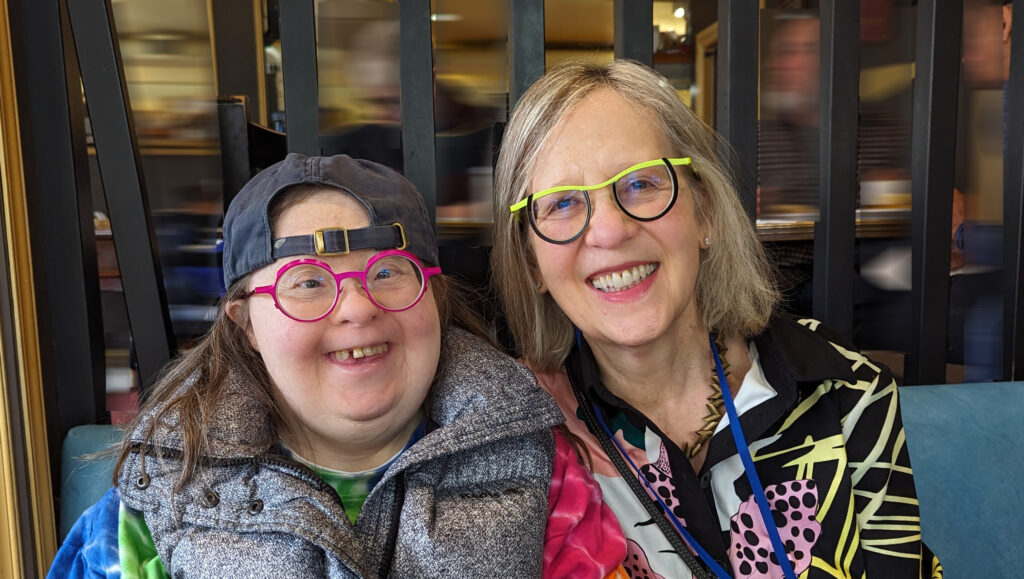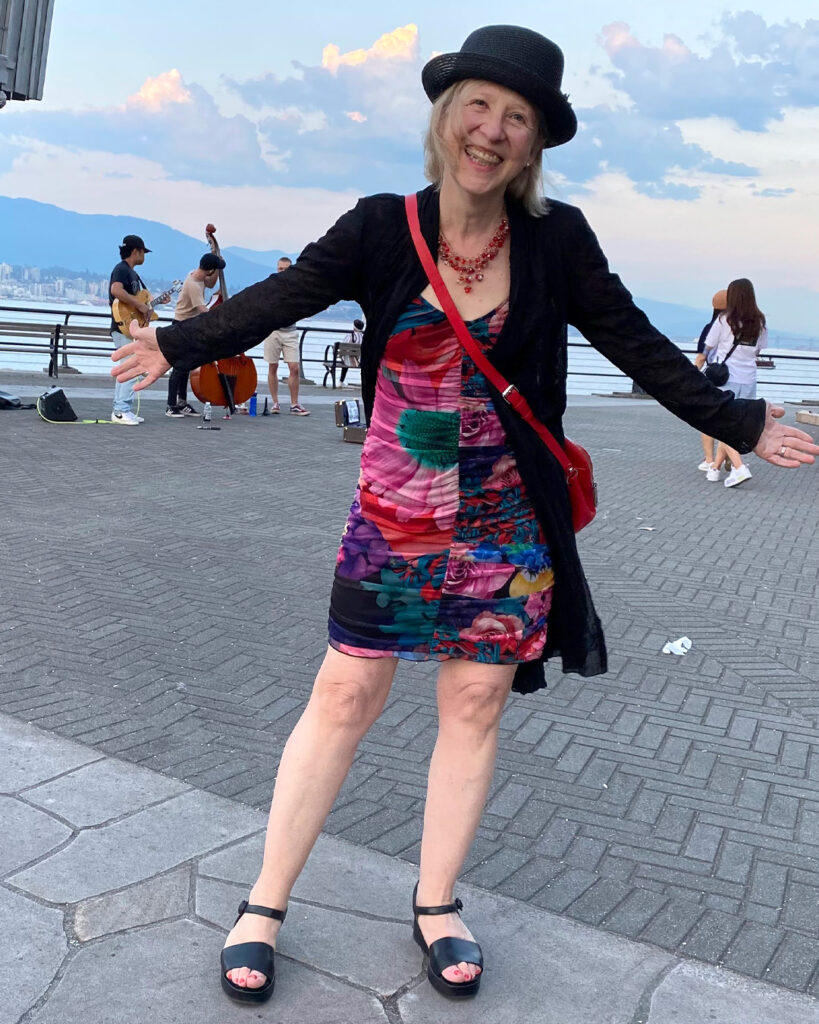
“Last month, I had the pleasure of reading Freeing Teresa by Franke James – a moving, emotional and powerful read about doing what’s right, no matter how difficult it may be. I’m so thrilled to be sharing a recent Q & A with Franke where she talks about Teresa, her books, and the hurdles she had to overcome to get this book published.” ~ Emily Quinn, A Quintillion Words
Emily Quinn’s interview with Franke James
In your own words, how would you describe Teresa? What is your favourite memory of her over the years?
FRANKE: There are so many! Here are just two memories. When Teresa was a toddler, I would tag along with my Mom and watch Teresa take personal training lessons. By age five, she was climbing the gym ropes. That was an eye-opening lesson for me that Teresa could accomplish amazing things with patience and perseverance.
As an adult, one watershed moment was when Teresa did her Change.org video. Previously, as a person with Down syndrome, she was not given any respect to direct her own life. In the 2014 video, Teresa marches along confidently, saying that she is “a female with Down syndrome” and wants the government to “say sorry” for taking away her right to decide, and putting her in a nursing home. It made me proud to see Teresa speaking up for herself. Since then, I’ve had many glowing moments as I’ve watched her blossom as an artist, author, and self-advocate. Finally, she is free to be herself.
Filmed in Victoria, B.C. by Billiam James
When did the idea of writing Freeing Teresa come to you? Were you experiencing a certain hurdle? Or did you always know you wanted to write about it one day?
FRANKE: Over a decade ago, I imagined that one day, I would write about what was happening to Teresa, my youngest sister. In 2013, all of my other siblings were intent on putting her into a nursing home. I was horrified and objected. However, one sister justified the group’s decision by saying that the government care agency had assessed Teresa, and taken away her right to choose where she lived. Another sister said Teresa was on the verge of Alzheimer’s. They all claimed she needed 24/7 care. I didn’t believe a word of it. Instead, I believed in Teresa. I saw her as being the same as she always was and enjoying life.
Did you find it difficult writing about your family, specifically some of your siblings? Is there anything you regret?
FRANKE: I regret that we lost our family. It’s a terrible blow, but sadly that was the price for standing up to the group and freeing Teresa. It was challenging to tell this story, but the hurdles forced us to find creative solutions. Since my family still doesn’t want to talk about this misadventure, I’ve given my siblings pseudonyms and whited out their images in photos. Also, Teresa is using a Pen name. These techniques have given me the freedom to tell this story and also gave a distinctive look to the book.
People have come up to me after my book talks, and confided that they know a young person who has been put in a nursing home. This growing awareness is so important. The statistics show that Teresa is the tip of the iceberg. She is just one of many to have experienced forced care. It is happening to people with disabilities around the world. Nursing homes have become the new Institutions.
Did you give your siblings advance warning of this book?
FRANKE: Yes, I gave them over ten years warning! Ample time for them to apologize to Teresa. But there’s been no apology yet. Of course, they also told me they’d never read my book. In 2013, on the same day we rescued Teresa, I told my sister, Siobhan, “If you block us on this, we will be taking this public. We’re going to go to all the different advocacy organizations. And we are going to make a really big deal of this. Because this is not right.”
Unfortunately they did block me, which I’ll talk about in the next book. Four days after we rescued Teresa, armed policemen came to my door to take Teresa back to the nursing home. Holey Moley, it was a very scary time. Fortunately, with legal help and documentation, we were able to assert Teresa’s right to stay with us.
How long did it take you to write Freeing Teresa, including writing, editing, any research and sourcing photographs?
FRANKE: A long time! In the actual moment, I made a record of the events that were swirling around me. (I learned this from my work on www.officepolitics.com.) I wanted to make sense of what was happening. But, as it turned out, all my emails, journals, photos, videos, and audio recordings, have become essential material for my book.
In 2020, when Covid hit, I started to write Freeing Teresa in earnest. Luckily, my husband, Billiam James, came on-board as the co-author, and we worked together to get the book written and published. Every week we’d sit on a park bench overlooking Lost Lagoon, in Stanley Park, and read a chapter to each other. It was fun and improved each chapter immensely. We published the print book in October 2023.
What is your favourite book? Is there a specific author or person who inspired you?
FRANKE: If I can only pick one book, I would say it has to be ENTWINED by Joyce Scott, published in 2016. Remarkably, Joyce rescued her twin sister, Judith, from an institution where she’d lived for 35 years. Their story was very inspirational to me, coming three years after Teresa came to live with me and my husband. Joyce’s book Entwined has some parallels to Freeing Teresa in that we’re both authors who have written memoirs about our sister’s with Down syndrome. Both of our sisters were trapped in the “care system” and we helped them get out. And both our sisters turned to art to express themselves. Judith Scott became a famous fibre artist and her art now hangs in the MoMA. It is a fascinating heart-warming story!
If you could tell a past version of yourself some advice for the future, what would it be?
FRANKE: Well, it could be something my mother tried to teach me when I was a cocky teenager, but I didn’t fully appreciate at the time. I used it in a dedication to my Dear Office-Politics book. I think she was very wise.
“Read between the lines.
Never take people at face value.
Listen to what people say, but watch what they do.
Put yourself in the other person’s shoes.
Never feel sorry for yourself.”
Tell us about your previous books and what you’re currently working on.
FRANKE: Since 2009, I’ve published three other books. They are all very different—and yet they were essential training for Freeing Teresa. Bothered by My Green Conscience taught me how to fight City Hall and win. Dear Office-Politics taught me to practice making ethical decisions—so I wouldn’t get run over by an ethical dilemma. And Banned on the Hill taught me many things, but how to use F.O.I. tools to dig for evidence was so helpful in Teresa’s case.
Our latest exciting news is that we have just published the audiobook for Freeing Teresa! It features a full cast of over a dozen actors, including Jackie Blackmore, Dayleigh Nelson, and Lauren Potter (of GLEE fame). Two of the actors have intellectual disabilities, which means we have “authentic representation” — something that is very important to me. It was a very ambitious dream to do the audiobook — and a full-cast one at that! Now the audiobook elevates my memoir to a whole new level. The full-cast of actors brings our true story to life in dramatic and exciting ways. I’m so happy we had the courage to do it.
Is there any advice you would give to a person with Down syndrome or anyone who cares for them?
FRANKE: Dream big! Assume that you can do anything you set your mind to! That’s good advice for the person with Down syndrome and also for the people who support them. If we have positive expectations for people with Down syndrome, we’ll give them abundant opportunities throughout their lives. And amazingly, these positive assumptions can become reality, like they have for Teresa Heartchild who was named a Champion for Change by B.C.’s Human Rights Commissioner.
About the author
The spark for Franke James’ newest book, “Freeing Teresa,” was lit ten years ago. In 2013, Franke and her husband, Billiam James, helped her younger sister get out of a Toronto nursing home, regain her decision-making rights, and get a public apology from the Ontario Minister of Health.
Earlier that same year, Franke had published Banned on the Hill, which led to her winning the BC Civil Liberties Award for Excellence in the Arts in 2014. Her related poster campaign, “Do Not Talk About Climate Change,” appeared in three Canadian cities and Washington, DC. In 2015, Franke was awarded PEN Canada’s Ken Filkow Prize for “tenacity in uncovering an abuse of power and commitment to fostering a national conversation in the face of censorship.” Franke lives in Vancouver, BC, with her husband and her sister, Teresa.

